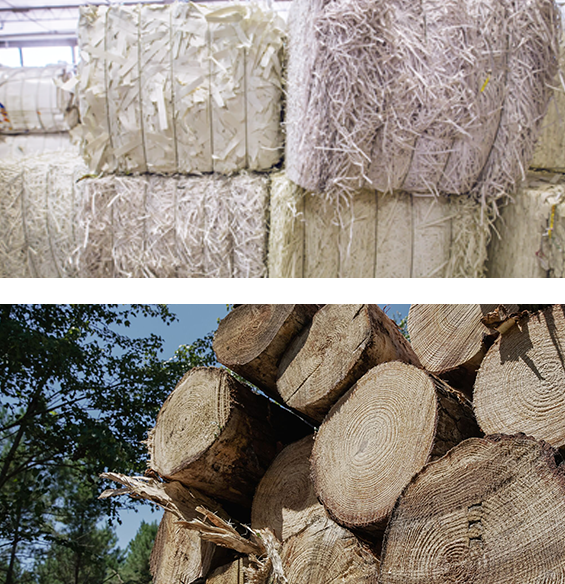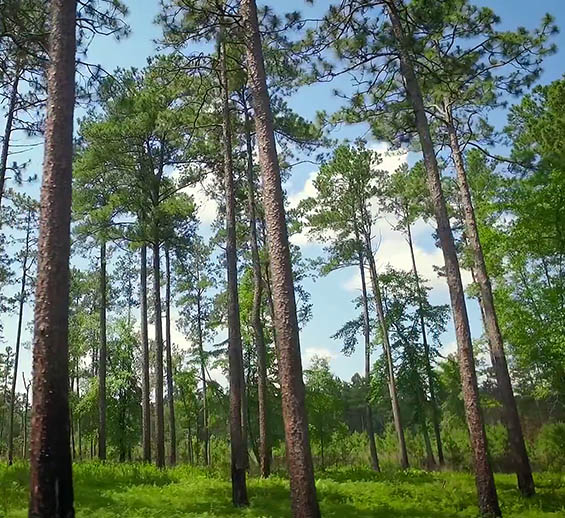With the growing demand for fiber-based products, it's more important than ever to ensure those products are responsibly sourced. Fiber-based packaging, pulp and paper products come from complex supply chains, which makes understanding what makes something "responsibly sourced" challenging.
Let's Start With The Basics:
Responsibly sourced fiber comes from both new and recycled sources.
Meeting the needs of global demand for packaging, paper and pulp products means that fiber must come from both new and recycled sources. Both types can be responsibly sourced.
New fiber is obtained directly from trees and hasn’t been previously used. The majority of fiber used to make paper products today comes from new fiber. A responsibly managed forest is one that is managed and used in a way that maintains its biodiversity, productivity and regeneration capacity, fulfilling its economic and social functions without harming other ecosystems.2
Responsibly sourced fiber comes from healthy, managed forests.
Recycled fiber is either pre-consumer fiber, which gets recycled before it enters the waste stream (such as scraps at a printer), or post-consumer fiber that has passed through its end-use (such as the box your last shipment came in) and made its way to recycling centers where it is re-pulped.
38%
of the fiber supply
in the U.S. is recycled fiber1


How Third-Party Certification Is Used For Sourcing
While third-party certifications are not the sole measure of supply chain sustainability, they are useful guides. If a paper product you encounter at the store has earned a third-party certification, this means that the fiber-based materials used in that product are traceable through a certified supply chain all the way back to a forest that has been certified to a specific standard.
There are two primary forms of certification: forest management and chain of custody.
- Forest Management: Certification of land management activities, from harvesting to reforestation, that confirms the forest is managed in a way that maintains the balance of social, environmental and economic benefits.
- Chain of Custody: Certification that verifies systems and procedures are in place to track wood fiber from the forest, through the manufacturing and converting processes.
Common Certification Systems Include:

Here at International Paper, we value certification. We have certified our mills and many converting facilities to these chain systems, and we engage forest owners to certify to the respective forest management standards to validate their responsible forest management practices. Learn more about third-party certification here.
Key Takeaway
International Paper adheres to all international and local forestry laws. These exist to protect forest health and the livelihoods of those living in them. But we go above and beyond to find ways to create an even more positive impact.
Responsibly sourced fiber-based products come from both new and recycled sources. The fiber originates from forests managed to promote social and environmental sustainability. Third-party certifications can help you identify responsibly made fiber products, from sustainable sourcing to forest management. However, many products are responsibly made whether they are certified or not.
Before making the decision to purchase a paper or packaging product, ask yourself:
- Does the company offer products certified to a third party standard?
- Does the company have policies in place to source materials responsibly?
- Is all the fiber used in the product harvested legally, withouth negatively impacting biodiversity, rivers and streams and biological systems?
- Does the company reject fiber from sources involved in the violation of human rights, including conflict timber?
- Can you trace the fiber back to its source?
- Does the company have a robust recycling program in place?
- How does the company prioritize employees and workplace safety?
- Is the company engaged with the community through charitable donations or volunteerism?
- Does the company utilize alternative energy to reduce greenhouse gas emissions?
- What is the company's approach to water stewardship?
- How transparent is the company with its sustainability practices?
Fun fact: International Paper checks "yes" on all of the above.
Learn more at InternationalPaper.com/Planet
Additional Resources
Downloads, fact sheets, reports and more.
FAQs
Answers to frequently asked questions about forestry, paper, packaging and pulp
Should I Go Paperless?
There may be good reasons to go paperless, but saving trees isn’t one of them
Learn MoreAre Recycled Paper Products Always Better for the Planet?
Recycling is only part of the sustainability equation
Learn More